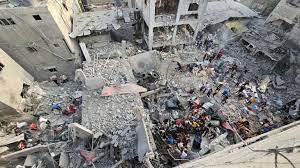“It’s crucial that Japan recognizes the rate of change in India today,” said Jaishankar
External Affairs Minister S Jaishankar praised India’s success story on Thursday, saying that Japan must recognize the country’s rapid transformation.
Jaishankar attended the first Raisina Roundtable in Tokyo today. He is now on a three-day visit to Japan from March 6–8.

“I think it is important that Japan today appreciates the pace of change in India,” the EAM stated, addressing the gathering there. Today, our nation is developing 28 kilometers of new highways daily, eight new airports annually, one and a half to two metro areas annually, and two new universities every day over the last ten years.
“This transformation of India makes us a more effective and credible partner, whether it is ease of doing business, ease of living, digital delivery, startup and innovation culture, or shaping the international agenda, India is clearly a very different country today,” Jaishankar said, highlighting the country’s thriving growth.
He noted that India is now building important east-west routes.
These include the trilateral highway heading east and the IMAC (India Middle East-Europe Corridor) proposal that runs across the Arabian Peninsula and the international north-south transport corridor.When finished, these corridors will cross Asia to link the Atlantic and Pacific. At the Raisina Roundtable, which was hosted in Tokyo by the Observer Research Foundation (ORF), Jaishankar said that India and Japan have similar perspectives about the need of transparent and cooperative connectivity.
Additionally, the Minister of External Affairs talked extensively on the Global South and emphasized that India is aware of its responsibilities.
As the spokesperson for the global south, India understands its responsibilities. Our development initiatives already include 78 countries on many continents. Could Japan and India work together to harmonize their developmental frameworks?Security and safety in the marine industry are now top priorities.
“It is certain that we suffered our first losses near the Red Sea.Enhancing our defense capabilities is also essential for the sake of the greater area. And Jaishankar declared.
Since November, the Houthis have been attacking military and commercial ships in the Red Sea, disrupting international commerce. As a show of support for the Palestinians in Gaza, the Houthis first said that they would attack ships with ties to Israel. Later, however, they broadened their objectives to include ships with ties to the US and the UK.
Notably, Jaishankar is visiting Japan from March 6–8. He had previously been to South Korea, where he had meetings with the country’s senior authorities.
He is in Japan for the 16th Strategic Dialogue between the foreign ministers of Japan and India, hosted by Yoko Kamikawa.
According to MEA, the two ministers will talk about matters of bilateral, regional, and international significance as well as share ideas on how to work together for a free, open, inclusive, peaceful, and prosperous Indo-Pacific region. (ANI)
Jaishankar said earlier in the day that freedom, transparency, and law-based order should continue to have the upper hand generally.
“It is also in our common interest that the overall balance remains in favor of the freedom, openness, transparency, and rules-based order with regard to powers that are so central to multipolarity in Asia,” he said.
“The world will observe how we will collaborate with one another to achieve the common objective through diverse partnerships and endeavors,” the EAM said.
“New balances are being sorted and occasionally achieved,” he said.
“The purpose of this discussion is to discuss how India and Japan, two countries with unique strategic and global partnerships, plan to address the issues confronting the international system. This topic has a lot of facets, Jaishankar said.







